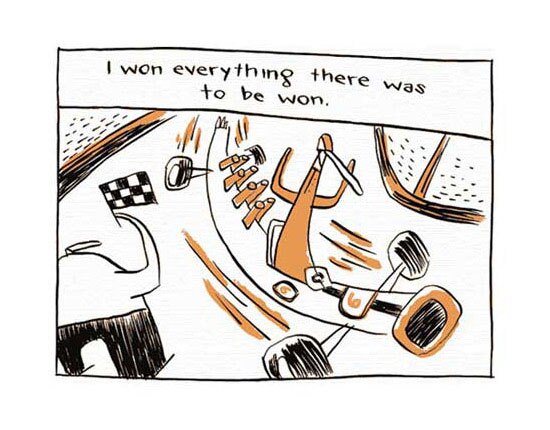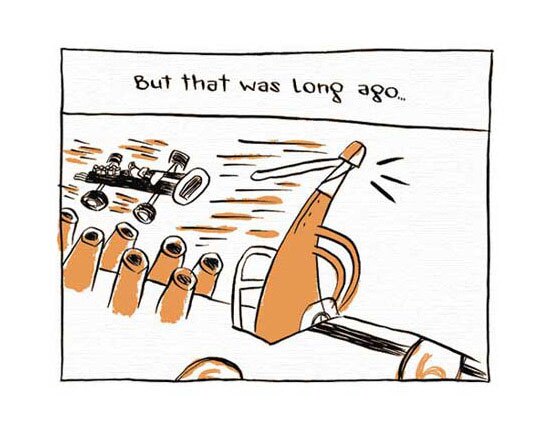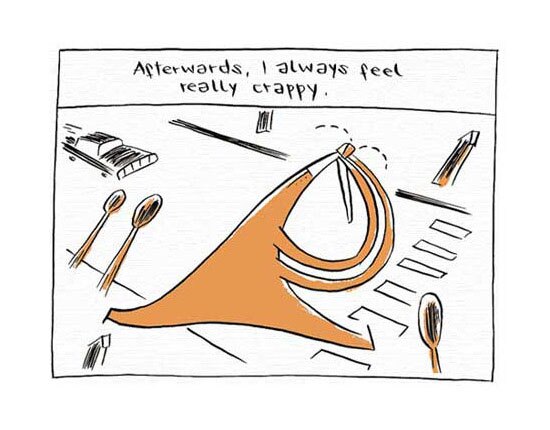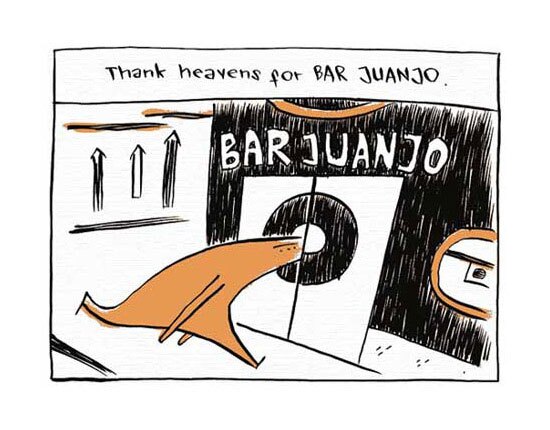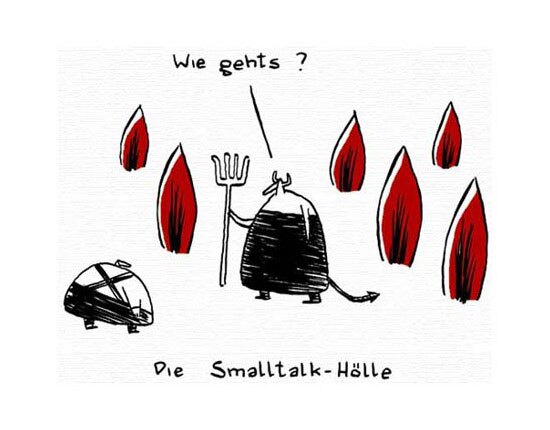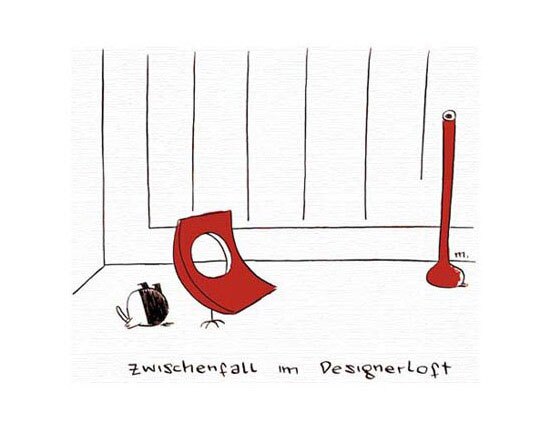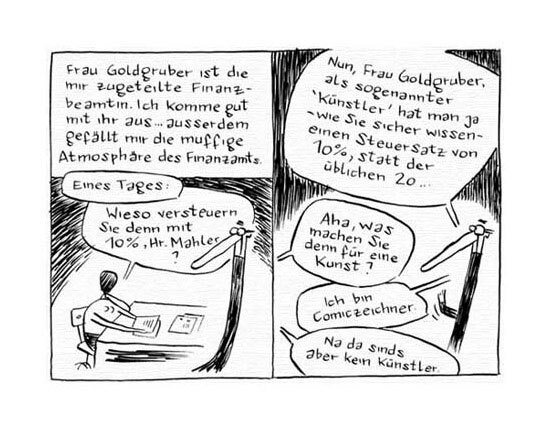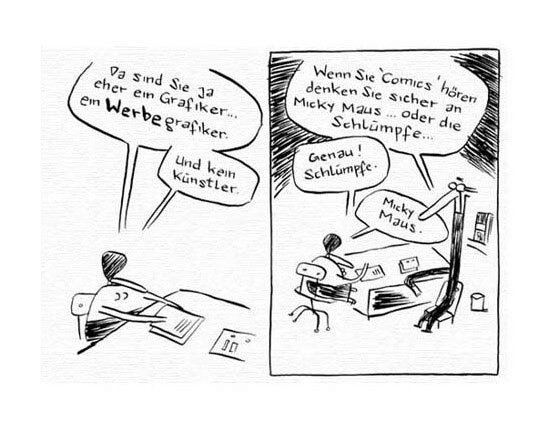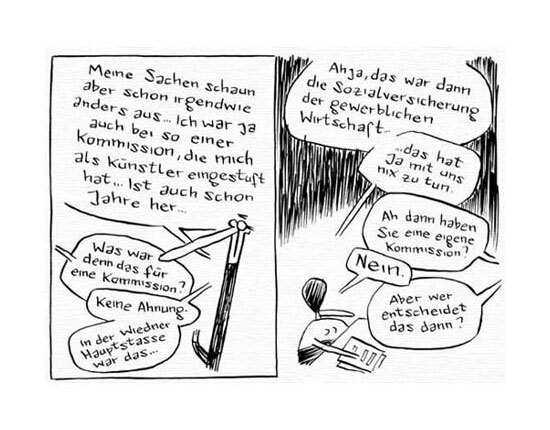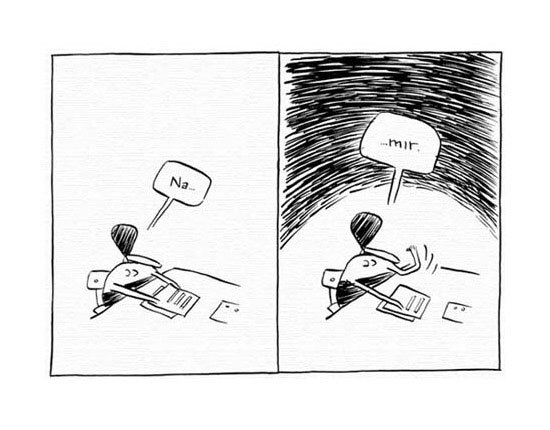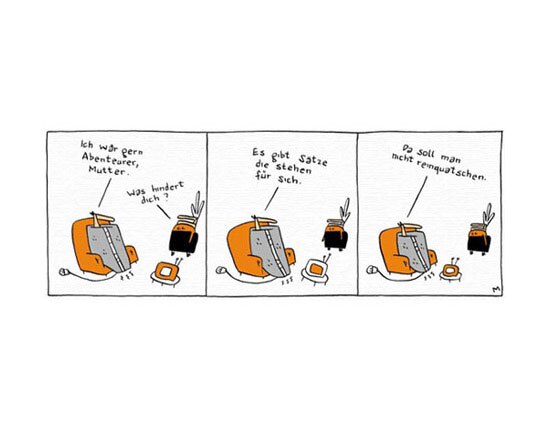Nicolas Mahler
The bizarre world of Nicolas Mahler
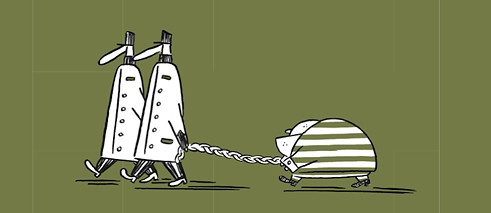
Nicolas Mahler is a gifted humourist and a master of the quick sketch: his protagonists’ stories unravel ad absurdum against banal and Kafkaesque backdrops full of comedy reeking of oppression and effortless poetry.
It is one bizarre world that Nicolas Mahler presents us with in his comic cartoons. As though viewed through a concave mirror, the Austrian distorts the outer appearance of his protagonists. Tall, slim figures are as thin and high as telegraph poles and plump short figures are as broad as they are high and practically roll around on the ground. Their extremities are given this grotesque treatment, too: their noses are longer than long and their stubby feet smaller than small. Mahler relishes working with humorous exaggeration, the classic stylistic device of caricature.
The author and artist is also a fan of the simple sketch and a master of reduction. Initially one almost suspects Mahler of laziness, for his figures have neither eyes nor mouths and thus the whole depiction of facial expression is side-stepped. He also tends to reproduce his images almost unchanged, thus avoiding having to grapple with intricate sequences or changing backgrounds.
The humour is in the details
Mahler, with his quiet and laconic dry humour and stubborn outsider characters, might be regarded as an Aki Kaurismäki of the comic and cartoon world. The Austrian’s pictures, like the images of the Finnish director, hold their own even without colour or words. In Serie Z Mahler portrays as affectionate dolts figures from horror stories such as Dracula, Frankenstein and werewolves utilizing only black and white and no text. Their physical quirks make them easy prey for the perils of daily life – not unlike us normal mortals. As a caricaturist, Mahler enjoys thwarting the antiquated subject. In Herrenwitz-Variationen (Variations on Bloke’s Jokes, 2008), for example, he takes up the embarrassingly bawdy jokes told by dirty old men and transforms them into new and more pleasant forms.Classic literature and poems as comics
Mahler is at home in the world of literature as his is in the sphere of comics and cartoons, and was honoured with the 2015 Preis der Literaturhäuser award at the Frankfurt Book Fair. His work is regularly published by Suhrkamp und Insel publishers, and he has released several literary adaptations. The first of these include Alte Meister (Old Masters, 2011), an extremely clever reflection on the comic as an art form based on a novel written by fellow Austrian Thomas Bernhard. Mahler’s economical and deftly drawn lines serve as a counterpoint to notoriously cantankerous Bernhard’s stirring diatribes.With Mann ohne Eigenschaften (Man without Characteristics, 2013), Mahler successfully condenses the work of another Austrian author, Robert Musil, delivering an idiosyncratic interpretation of the classic text in just 150 wordless pages. Musil’s novel has long been deemed unadaptable; a verdict Mahler proves wonderfully wrong.
Mahler also confidently tackled one of the most important French novels, Marcel Proust’s In Search of Lost Time (2017), creating an original abridgment of the timeless classic. He work allows the reader to see Proust’s text with different eyes. Mahler’s ploy was to skip the Madeleine, the lime blossom tea, and even the legendary first sentence, and choose instead to view Proust’s concept of “involuntary memory” through a musical lens.
In Partyspaß mit Kant (Party Fun with Kant, 2015), Mahler recounts the history of philosophy in comic form. Mahler plunges the reader into the everyday lives of the 22 most famous world philosophers, who enjoy a party with Kant, see an art exhibition with Hegel, go grocery shopping with Marx, join scout camp with Nietzsche, watch a movie with Delouse, and celebrate a dream wedding with Simone de Beauvoir. While it’s unlikely that the events Mahler imagines ever took place, his fabrications bring us closer to the life, thoughts and feelings of the respective philosopher with subtle humour, while making us smile at the folly of human existence.
Mahler is no stranger to poetry either – and has published collections of his work like Dachbodenfunde (Attic Finds, 2015). The master of graphic reduction, Mahler uses language very sparingly too. Based on the clinical descriptions found in old toy auction catalogues he employs minimal means to create a strange atmosphere of comedy and melancholy. With his next poetry collection, Isolierzelle (Isolation Cell, 2016), Mahler adapts hobby and technology magazines from the 1920s to 1960s, distilling their absurd texts into words and illustrations. In Gedichte (Poems, 2013), Mahler takes his textual adaptations one step further with graphic poems in which images replace letters - visual poetry in the truest sense of the word.
a comic artist at the tax office
Even if the dialogues in Kunsttheorie versus Frau Goldgruber(i.e. Art Theory versus Ms Goldgruber / 2007) can scarcely be surpassed, this comic volume is based on a true event; Mahler’s long-winded discussion with Frau Goldgruber, a tax officer assigned to him. The conversation about whether he is an artist or not – since in Austria the tax rate of 10 or 20 percent depends on this – develops more and more into a discussion of basic issues about comics as an art form and art in general. In his autobiographical collection Die Zumutungen der Moderne (i.e. impertinences of modernity / 2007), Mahler narrates his grotesque experiences in everyday life. Whether he is teaching comic drawing at the Volkshochschule (Germany’s network of adult education centres, trans. note) or as a guest at various international comic and animation festivals, Mahler attracts not only odd people, he also knows how to relate the bizarre encounters with exquisitely dry humour.In 2006 Mahler was honoured with the Comic Salon Erlangen’s Max and Moritz Award for his wonderfully humorous comics in the collection of his works Das Unbehagen (i.e. discontent), additional distinctions followed, among them the Max and Moritz Award once again in 2010, however in the category best German comic artist.
